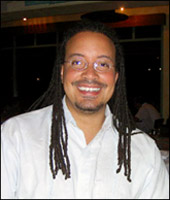environmental movement
-
A new think tank tries to link up justice, poverty, and green issues
 There's been a lot of talk since ... well, forever, but especially since the paper that shall go unnamed, about greens forming strategic alliances with other progressive groups. One such proposed alliance is between big green groups and groups working to fight racism and poverty. Most of this, sad to say, is just talk, but Joel Makower brings word of Reclaim the Future, a new think tank from Van Jones' Ella Baker Center that's trying to make it happen.
There's been a lot of talk since ... well, forever, but especially since the paper that shall go unnamed, about greens forming strategic alliances with other progressive groups. One such proposed alliance is between big green groups and groups working to fight racism and poverty. Most of this, sad to say, is just talk, but Joel Makower brings word of Reclaim the Future, a new think tank from Van Jones' Ella Baker Center that's trying to make it happen.Reclaim the Future's slogan is "Green Jobs, Not Jails," and as you might gather, the idea is "representing and empowering ecologically sound, urban entrepreneurs and the communities they provide opportunities for." Jones says the goal is to quickly find a kind of showcase project -- an urban green business that's profitably employing recently incarcerated or at-risk youth -- and leverage the hell out of it. "We want to create a demonstration project that gives us the opportunity to go out and build the political constituency that can multiply that by a thousand-fold," he says. To which I say: Godspeed.
I've often thought that all the talk about bridge-building between extant progressive groups isn't going to amount to much. Institutional cultures and habits are deeply ingrained. From Joel's post:
-
An environmental-justice advocate insists he’s not dead yet
Ludovic Blain. “The Death of Environmentalism” should be called “The Death of Elite, White, American Environmentalism.” A critique of the environmental movement that draws on neither the perspectives nor achievements of the environmental-justice (EJ) movement is, at very best, incomplete. That the DOE interviews and recommendations only focused on white, American male-led environmentalism meant that […]
-
The environmental movement won’t thrive till it tackles economic development in low-income districts
Growing up in east Los Angeles as the son of Central American immigrants, the everyday challenges faced by the people in my community seemed far removed from the American dream: the lack of good housing and jobs, failing schools, scraping together money for groceries, and all-too-common police brutality. If you had asked us, we would […]
-
Why race and class matter to the environmental movement
This piece is excerpted from the essay “The Soul of Environmentalism: Rediscovering Transformational Politics in the 21st Century.” The full essay can be found here. Elvis was a hero to most,but he never meant shit to me …— Public Enemy, 1989 Activists of color may not want to stand on John Muir’s shoulders. Environmentalism in […]
-
Mag looking for eco-gals to take it all off
Well, for one issue. Kinda.
From a Playboy press release dated today:
Playboy magazine is searching for the sexiest environmentalists in America, women willing to take it all off for their favorite cause. The magazine is planning a pictorial for an upcoming issue featuring women involved in environmental causes or with groups dedicated to saving the planet or protecting wildlife. In addition to a modeling fee for each of the participants, Playboy will make a donation to the favorite causes of the women chosen to appear in the pictorial.
But will they be as hot as Leona Johansson?
Much as I'd love to help Grist get more exposure (ahem), I won't be entering myself. But the rest of you "enthusiastic and uninhibited environmentalists," as Playboy puts it, have at it. Call 312.373.2717 for details.
(And you thought gastroporn was racy.)
-
Is there tension between them?
I am an atheist.
I wouldn't call myself a "militant" atheist, as I don't consider being an atheist a big part of my life or my self-image. I don't believe there are furry three-eyed ghosts floating behind me at all times, but I don't get militant about that either. Why bother?
However, in these times we live in, there's a strange pressure to show extreme deference to religious proclamations, however expressed, no matter how absurd the content. Witness, for instance, the global media lovefest when the pope died, during which I read a quote from a bishop who said, "papal infallibility doesn't mean you get it right every time." Oh? Gosh, that sounds kinda dumb to me. But I'm not allowed to say so.
I'm allowed to say that I have a "difference of values" with far-right religious folks about homosexuality, but I'm not allowed to say that finding justification for discrimination in a millennia-old Jewish holy book is %$@#! stupid and irrational.
But whatever. Most of the time, I can live with this -- I reside in a secularist blue-state bubble anyway, and I figure the current wave of backwards medieval religious sentiment will pass in due time. Live and let live, I say.
But Richard Dawkins, author of celebrated evolution masterwork The Selfish Gene, does not share my attitude. He shows no deference and hedges no bets. This interview with Dawkins in Salon is, in that way, utterly refreshing. It reminds you how few people, despite the perpetual delusions of persecution on the part of modern-day right evangelicals, are willing to openly criticize the religious -- despite their complete lack of restraint in criticizing us atheists.
My point? Glad you asked. The one thing I would ding Dawkins for is this exchange:
-
What’s your secret eco-sin?
Environmentalists have a reputation for being self-righteous, holier-than-thou prigs. And yeah, well, they frequently are. So in the spirit of humanizing and soul cleansing and all that, we've asked a few greens, including writers Bill McKibben and Terry Tempest Williams, to confess their environmental sins. And we're asking you to do the same!
Leave your deepest, darkest environmental sins in comments. We promise, you'll feel better afterward.
-
Sustainability is best served by empirical research, not dogma
I am constitutionally averse to orthodoxies. I don't like it when means become ends in themselves. I don't like it when solutions to problems become holy writ even after the problems are solved. I don't like it when objections to a practice become dogma even when the practice has changed.
In some areas -- religion, for instance -- orthodoxy is built in, and of course many movements become de facto religions as methods harden into unquestioned dogma. (See: early 20th century communism.) But in a secular, democratic society, orthodoxy has no place in public policy. The raison d'etre of a democratic government is to pursue the mutually agreed-upon goals of its citizenry using the methods empirically demonstrated to be effective, within the bounds of the law. This is a bit idealized, of course, but you get what I mean.
Environmentalism has, in many people's eyes, become a religion. I don't think this is quite true, but I certainly know of greens who behave more like priests than scientists, forever condemning any dissent from the straight-and-narrow and excommunicating those who stray. I find this kind of stuff obnoxious -- aesthetically, morally, but most important, pragmatically. The question of how best to protect our natural resources and put human civilization on a sustainable course is empirical, involving a smart synthesis of scientific data, political savvy, and a sense of the possible. To that end, there should bo no verboten topics, no discussion or argument that's out of bounds. No one should feel any "shame" for bringing up sensitive topics.
This was meant to be a prelude to a post, but it's gotten too long, so I'll split it in two. More shortly.
-
Evangelical enviros leery of associating with, uh, enviros
Richard Cizik, head of the National Association of Evangelicals, is heavily hawking the notion of "creation care" these days. (That would be God-flavored environmentalism, for those not in the know.)
Three weeks ago, he chatted up the concept with NPR's Scott Simon (whom I wholly adore, but that's a topic for another post).
This past weekend, he got his mug and his pitch in The New York Times Magazine, via a Q&A with Deborah Solomon. An excerpt:
Q: What is wrong with [the] term [environmentalism]?
The evangelicals don't want to play with the enviros, and -- sad, but true -- that's probably smart strategizing. The Christian right already knows how to get Bush's attention, and Rove's devotion. Can any green groups say the same?A: It's not the term. It's the environmentalists themselves. I was recently speaking with the leadership of the Sierra Club and the National Wildlife Federation, and I told them, ''Gentlemen, I respect you, but at this point don't plan on any formal collaborations.''
Q: Why? Because they lean to the left?
A: Environmentalists have a bad reputation among evangelical Christians for four reasons. One, they rely on big-government solutions. Two, their alliance with population-control movements. Three, they keep kooky religious company.
Q: What is your idea of a kooky religion?
A: Some environmentalists are pantheists who believe creation itself is holy, not the Creator.
Q: And what's No. 4?
A: There's a certain gloom and doom about environmentalists. They tend to prophecies of doom that don't happen. Look at the movie "The Day After Tomorrow," in which New York City freezes over.

